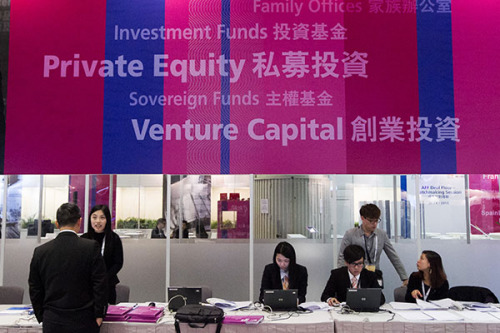
Investment consultants provide advice to startups in an office in Wan Chai district, Hong Kong.(Photo provided to China Daily)
Hong Kong SAR government looks to foster innovation with its dedicated arm
Despite the golden sunshine and the allure of world-renowned research institutes, Winnie Lun did not want to stay on in California. After spending 30 years in the United States, Lun decided to return to Hong Kong, her home city, lured by the abundant government grants that would help fast track the growth of her biotech company.
Lun is the founder of eNano Health, which has developed a non-invasive, affordable method of glucose testing using saliva. Schemes under the government's Innovation and Technology Fund have provided eNano Health with over $600,000 for research and development purposes. Such funding mechanisms are "essential for biotech companies" as research and clinical trials often incur huge costs, Lun said.
Her company is currently an incubator at the Hong Kong Science Park - a technology cluster set up by the government 14 years ago.
As an ongoing effort of the government to support innovation in Hong Kong, Chief Executive Leung Chun-ying has been touting his plan of setting up an Innovation and Technology Bureau for three years, and lately at the opening of a 3-D printing gallery.
"The Hong Kong government will continue to push forward to set up the ITB, which will be tasked to coordinate the entire technology team of Hong Kong, so as to support the development of innovation and technology industry," Leung said.
Though Leung had proposed the establishment of ITB in his election manifesto in 2012, the plan was put on hold due to filibustering in the Legislative Council.
However, as Leung reiterated the government's ongoing support for innovation and technology, a wave of controversy was building after an earlier police raid on Uber's Hong Kong office.
The ride-hailing app was accused of operating without a license and insurance, both of which are required for traditional taxi services. Industry sources have expressed apprehensions that the dated regulations are a hindrance to fostering innovation in the city.
Sam Gellman, general manager of Uber Hong Kong, has called for "smart regulations" for innovative businesses in the city.
"A smart city must have smart regulations fit for a digital age, and we look forward to working closely with regulators towards developing a regulatory approach that enables more choice and innovation while putting the safety and interests of riders and drivers first," Gellman told the South China Morning Post after the raid.
As some startups struggle to move forward, various players in the ecosystem hold different expectations regarding the role the government should play in driving innovation.
In early August, Witman Hung Wai-man, president of Hong Kong's Internet Professionals Association, urged the government to "stay out of the way" of the innovative companies.
The primary role of the government is to create the infrastructure and environment to make things easier for entrepreneurs, instead of building roadblocks, Hung told an audience at the Global Youth Entrepreneurs Forum in Hong Kong.


















































